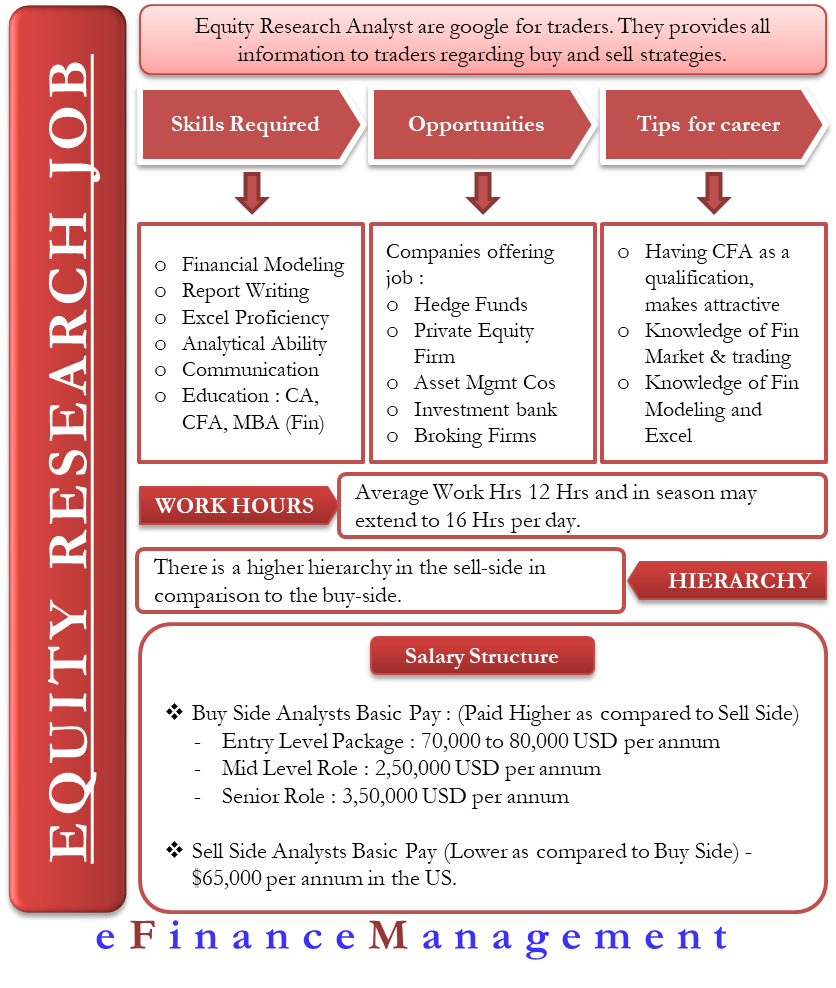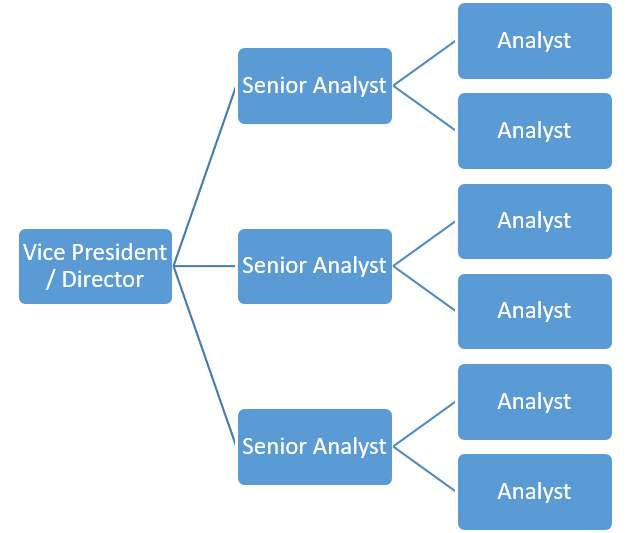An equity research job is one of the most sought-after job profiles in today’s world. Challenging profiles and high compensation makes it an attractive career option for many job aspirants.
Equity Research Job – Snapshot
First of all, let us have a snapshot of how a day of an equity research analyst goes. The movies like The Wolf of Wall Street, In pursuit of happiness, and Wall Street, give us a fair idea of the work-life of an equity analyst. Equity research analysts are ‘google’ for the traders. They provide them with all the information (or can decipher) under the sun about which company to buy or which one to sell, when to enter into a trade, how is the state of the economy, etc.
An equity research analyst’s job majorly requires him to prepare equity research reports that give a detailed view of a company’s financial performance, industry, and economy. They also provide estimations of the future performance of a company.
Skills Required
Two important skills that are mandatory for an equity analyst are financial modeling and report writing. Proficiency in Excel is an added advantage. For a person to be successful in the equity research field, he should possess strong quantitative and analytical abilities. A person’s ability to identify trends, interest to get deeper into the details, and a strong eye for details are appreciated in this field. An equity research analyst should also possess great communication skills to communicate his investment strategies to the clients.
Also Read: Equity Research Firms
Educational Qualifications
Equity research firms prefer a person with a finance or economic background. MBA in finance, CA, CFA is the most sought-after educational qualification.
Following is a sample job description for an equity research job in a reputed firm:
Read more about Equity Research Analyst.
Job Description
We are currently looking to hire an equity research analyst for a global bank. This role will be part of the Global Research team of an MNC Bank.
Requirements
On the technical side, we are looking for someone with strong financial valuation/modeling skills. Someone who has a clear idea of the market in terms of investments and has a strong stock pick pitch would be preferred.
Job Responsibilities
- Build & maintain basic models (for both covered and not covered companies)
- Market share, macro trend, and cross-company and sub-sector data analysis
- Company-specific projects
- Statistical analysis of economic data, fundamentals, and relevant correlations of data
- Listen to and produce briefing notes on comparative companies- conference calls not covered by the team.
- Update monthly reports, marketing book, and weekly shells
- Update and maintain daily valuation sheets
- Check through annual reports for discrepancies/additional data
- Assist in writing research reports
Educational Requirements
Looking for MBAs / MS Finance/CFA – with some experience in either Equity Research / Financial Research / Financial Valuation of companies, etc.
Career Path Options
After graduating, a person can choose to either do a master’s degree in finance or do a CFA certification to enter into the equity research field.
He can choose to work in either buy-side or sell-side equity research firms. Though the work done by both sides is almost the same, the difference lies in what kind of clients they serve.
Also Read: Equity Research Analyst
Buy-side analysts work for buy-side firms involved in buying the securities to earn better returns. Sell-side analysts work for sell-side firms that facilitate corporates to sell their stocks or bonds in the financial markets.

Companies that Offer Jobs to Equity Research Analysts
Hedge funds, pension funds, insurance companies, asset management firms, and private equity firms hire buy-side analysts. Investment banks, brokerages, and commercial banks hire sell-side analysts.
Following is the list of a few popular companies in the world:
Hedge Funds
- Blackstone Group
- Eagle Asset Management
- HBK Capital Management
- Renaissance Capital
Private Equity Firms
- Bain Capital
- Carlyle Group
- TPG Capital
- TA Associates
Asset Management Companies
- Blackrock
- The Vanguard Group
- UBS
- State Street Global Advisors
- Fidelity Investments
Investment Banks
- Goldman Sachs
- JPMorgan Chase
- Barclays Capital
- Deutsche Bank
- Wells Fargo and Company
- Bank of America Merrill Lynch
- Morgan Stanley
- Citigroup
Brokerage Firms
- Associated Securities Corp.
- AXA Advisors, LLC.
- Ameritas Investment Corp.
- Capital Financial Group
- S. Bancorp Investments, Inc.
- Lincoln Financial Advisors
A Typical Workday of Equity Research Job
The average working hours of an equity analyst is around 12 hours per day. However, this might increase to up to 16 hours a day during the earnings season.
Let us assume Mr. X is an equity analyst and works with one of the major investment banks in the world. He is required to arrive at the office as early as 8:00 AM, a couple of hours before the market opens. He spends time hovering through the emails, talking to traders and clients, catching up with the latest news, and observing overnight market movements. The rest of the day is allocated to researching the companies in his portfolio and building financial models. He also makes time to track the latest earnings releases of the companies and prepare detailed equity research reports. However, junior team members spend most of their time building financial models and writing reports. Senior team members spend their time interacting with the clients and traders and building investment strategies.

What does Equity Research Job Offer as you Grow?
The organizational hierarchy on the sell-side is more in comparison to the buy-side.
On the sell-side, a person usually starts as an associate and adorns the role of analyst and senior analyst, and Research Director as they grow up the ladder. On the buy-side, the hierarchy is rather simpler. Director, Managing Director, or Vice President (VP) is the highest designation. Many analysts and associates work for him.
The equity research industry is growing in tandem with the global economy. The financial crisis of 2008 had taken a toll on the investment banking and equity research sectors. Many investment banks and commercial banks had shut down their operations after the crisis.
Equity Research Analyst Salary
A job in the equity research field is one of the most attractive options for people willing to start their career in finance. It is obviously because of the high compensation packages and exciting job roles they offer. As in all the other careers, equity analysts’ salary varies as per many conditions like skill set, qualifications, position, company, city, and others.
Salary of Buy-Side Vs. Sell-Side
Equity research analysts work for two types of firms – buy-side and sell-side. Analysts working for buy-side firms are buy-side analysts. People conducting equity research at sell-side firms are sell-side analysts. Buy-side people are involved in buying the securities. Examples include institutional investors, pension funds, mutual funds, venture capital firms, etc. Sell-side people are involved in selling those securities to buy-side people. Examples include investment banks, brokerages, etc.
Salary Structure
Now that we know the differences between buy-side and sell-side analysts let us also understand that the skills required by them are slightly different, and so are their pay structures.
Buy-side analysts require a larger skillset than sell-side analysts do. Therefore, they command higher compensations. The major part of their salary also includes a performance bonus in the form of equity shares or a fee plus commission (in the case of hedge funds). The average equity analyst salary in an entry-level working at the buy-side in the US is in the range of is $70,000-$80,000 per annum. The bonus component makes up 50% – 75% of the base salary. As the role increases, the base salary also increases. For example, a portfolio manager (mid-level role) in a hedge fund company can get a base salary of up to $250,000, while the head of equities or credit (senior role) could reach $350,000. The icing on the cake continues to be the bonus.
On the other side, sell-side analysts earn slightly lower than buy-side analysts. As per Indeed, a job portal site, the average equity analyst salary on the Sell-side is about $65,000 per annum in the US.
Hierarchy
There is a higher hierarchy on the sell-side in comparison to the buy-side.
On the sell-side, a candidate, who is a college fresh passed out, is usually given the role of an ‘Associate’ or Junior Analyst’ on joining the equity research firm. This is the entry-level position at either buy-side or sell-side equity research firms. As he grows up the ladder (within three years), he becomes an ‘Analyst.’ The next role that he would adorn is a ‘Senior Analyst.’ The Research Director heads many senior analysts.
On the buy-side, the hierarchy is rather simpler. Director, managing director, or Vice President (VP) is the highest designation. Many analysts and associates work for him.

Role-Wise Salary Statistics
According to an article in mergersandinquisitions.com, the average salary (including bonus) of an ‘Associate’ level was between $125,000 to $200,000 in 2018. Post-MBA and graduate-level hires have earned in the middle-to-high-end of that range and possibly slightly above it.
The compensation for a Vice President (VP)-level professional was in the range of $200,000 to $300,000. Almost about 75% of this figure is their base salaries. However, at smaller banks, VPs earn below this range.
Directors (a role above VPs in some financial institutions) might earn between $300,000 and $600,000. At this level, the year-end bonus makes a huge impact on total compensation.
Tips for a Successful Career in Equity Research
- Many companies seek candidates with a CFA Qualification. Therefore, having one makes your candidature more attractive.
- Good knowledge of financial markets and trading will help to understand the client’s needs better.
- Good hands-on experience in financial modeling with expertise in Excel are key USPs of an equity analyst.

